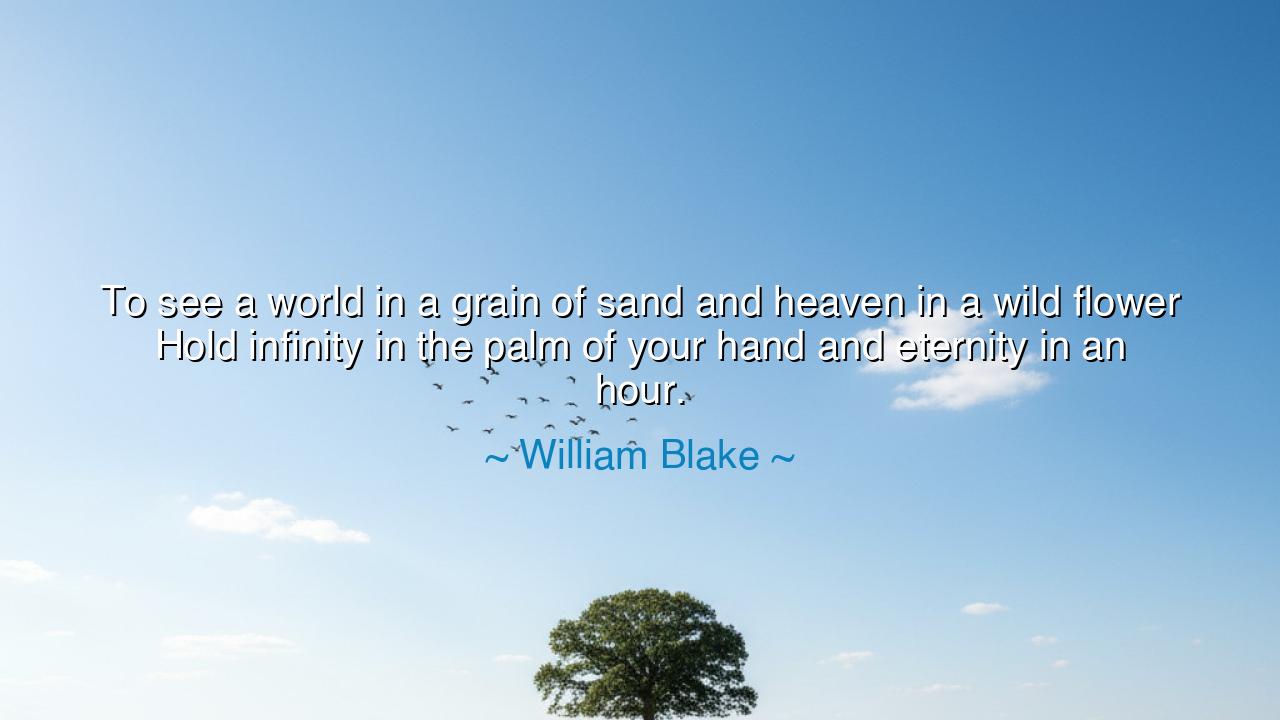
To see a world in a grain of sand and heaven in a wild flower
To see a world in a grain of sand and heaven in a wild flower Hold infinity in the palm of your hand and eternity in an hour.






In the timeless words of William Blake, "To see a world in a grain of sand and heaven in a wild flower, Hold infinity in the palm of your hand and eternity in an hour," we are invited into a vision that transcends the limitations of time and space. Blake, a poet and visionary, offers us a glimpse into a way of seeing the world—not through the lens of the mundane, but through the eyes of the eternal. What Blake speaks to is the ability to recognize the vastness of existence, the infinite nature of the universe, in the simplest of things. To truly see is not merely to look, but to perceive with a depth that touches the core of existence, where every moment contains all that has ever been and ever will be.
In ancient teachings, there was a belief that the divine could be glimpsed in the smallest parts of creation. The Taoist sages of China spoke of the universe being contained within each grain of sand, each drop of water. They understood that in the seemingly insignificant lies the entire cosmos—that the larger whole can be reflected in the smallest fragment of life. Blake’s words echo this profound insight. He calls us to find the world within the most humble of things, to understand that the infinite is not found in some distant realm, but right here, within our very reach, in the world that surrounds us.
Consider the ancient philosophers who sought to grasp the nature of existence through observation and contemplation. Heraclitus, known for his teachings on the unity of opposites, believed that the cosmos was in a constant state of flux, yet every part of it was intimately connected. To him, the logos—the divine reasoning or order of the universe—could be found in the smallest of details, in the flow of a river or the changing of the seasons. Like Blake, Heraclitus taught that through deep awareness and observation, one could glimpse the eternal in the transient, the infinite in the finite. The grain of sand and the wild flower become not just objects, but windows into the vast mysteries of existence.
Blake’s quote also speaks to the concept of presence—of being fully aware in the moment, of holding infinity in the palm of your hand. This idea calls us to experience life not as a series of passing events but as a continual unfolding of the eternal. In the ancient world, this understanding was central to many spiritual practices. The Buddhists, for example, have long taught that through mindful awareness, one can experience the universe in its entirety within a single breath, a single moment. To be present is to touch eternity, to step beyond the constraints of time, and to enter into a space where all things are interconnected and the divine is palpable in the ordinary.
We see this same truth reflected in the teachings of Ralph Waldo Emerson, who, inspired by the mystics and the natural world, wrote that the beauty of life is found in the smallest details. For Emerson, as for Blake, every moment was charged with meaning, every leaf, every stone, every ripple in the water contained within it the whole of existence. Emerson believed that in nature, in its purest form, one could find the answers to life’s most profound questions. In the wildflower, the universe unfolded, and in the grain of sand, one could see the vastness of the cosmos. This kind of vision—one that finds meaning in the most ordinary—is a gift that requires deep reverence and awareness.
Let us now turn to the lesson Blake imparts. It is clear: the infinite is not some distant thing, reserved for the heavens or the afterlife. It is here, in the present, in the world that we can touch and see and feel. To truly live, to truly understand the essence of existence, we must look deeply at the world around us. A single grain of sand, a single wildflower, holds within it the entire universe. If we can learn to see in this way, we will come to understand that eternity is not outside of us, but present in every fleeting moment. To live fully is to live with awareness, to honor the infinite in the most humble of things.
And so, we are called to take this lesson into our own lives. See the world in the smallest of details. Be present in every moment, knowing that within it lies all the wisdom, all the beauty, all the truth that you need. Find the divine in the wildflower, the cosmos in the grain of sand. Practice deep awareness in all that you do, for in doing so, you will hold infinity in the palm of your hand and live fully in the ever-present embrace of eternity. Whether in nature or in your own life, recognize that the vast and the eternal are never far—they are right here, now, in the simplest moments.






AAdministratorAdministrator
Welcome, honored guests. Please leave a comment, we will respond soon